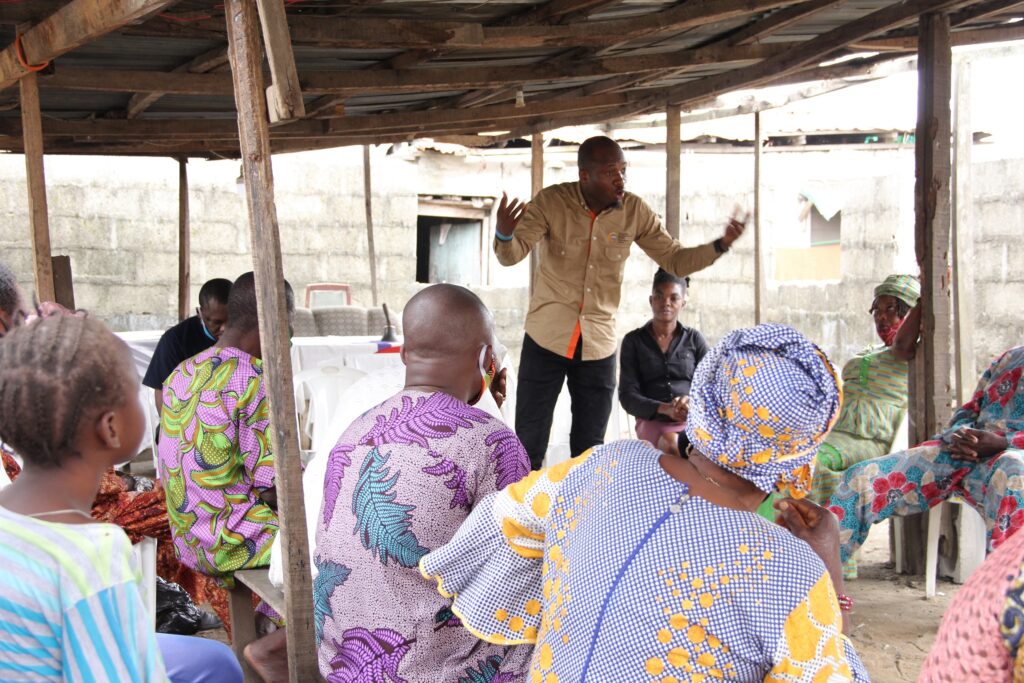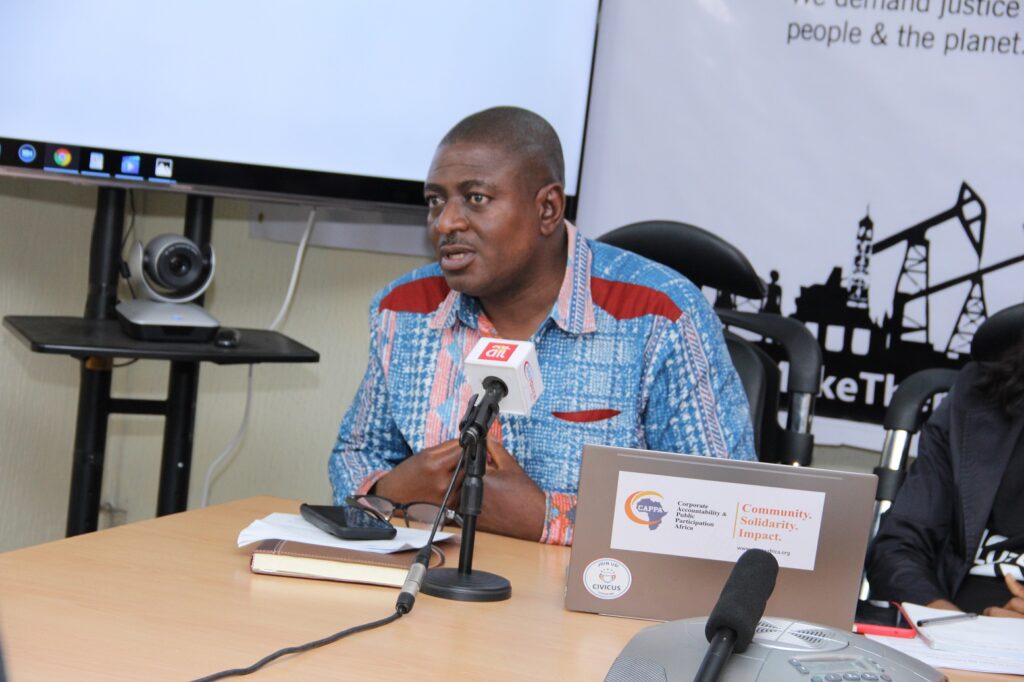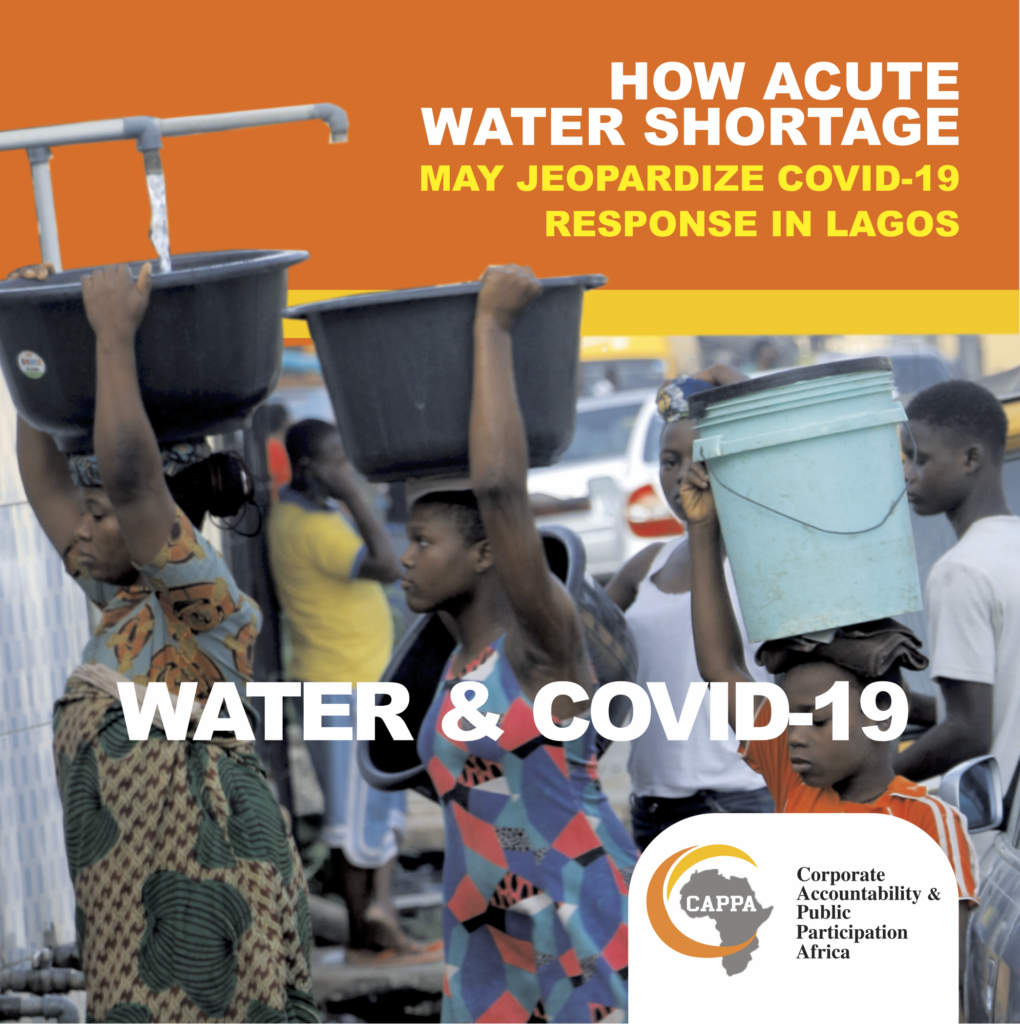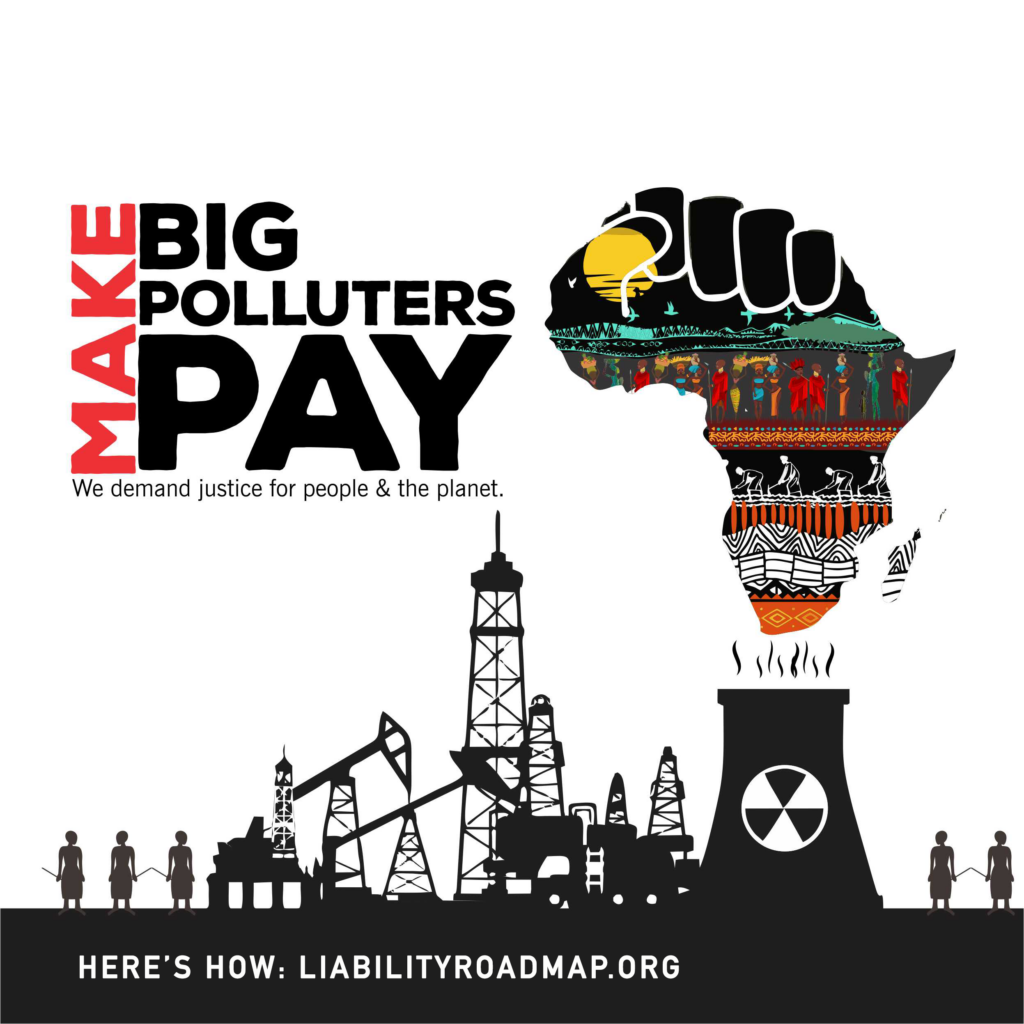We partner with powerhouse organizations across all of our campaigns. Below, learn more about our close allies Corporate Accountability and Public Participation Africa and The Global Campaign to Demand Climate Justice.
Mobilizing shared power: Corporate Accountability and Public Participation Africa (CAPPA)
When the water system of Lagos, Nigeria seemed on the brink of privatization, environmental and social justice organizers based in the metropolis sprang into action. Longtime allies in tobacco campaigning, these organizers invited Corporate Accountability to join them—and the “Our Water, Our Right” campaign was born in Lagos. Six years later, neither corporate interests, the World Bank, nor the Lagos government have been able to succeed in their privatization plans.
In fact, the campaign has been so successful that the Lagos-based organizers determined they needed a more robust platform to carry the work beyond Nigeria. And so they launched Corporate Accountability and Public Participation Africa (CAPPA). Today, CAPPA’s work is advancing water justice and environmental justice across the African region, with support from and in solidarity and friendship with Corporate Accountability.
“Our Water, Our Right” resounds across Lagos
The “Our Water, Our Right” campaign continues to win victories in Lagos, holding off water privatization and advancing water justice. CAPPA’s robust organizing and ability to earn a steady stream of media ensures that the campaign continues to make waves.
The award-winning campaign has empowered communities all over the city to hold their own “water parliaments.” These communities carry out actions to oppose privatization and call for public solutions, sometimes in partnership with the larger campaign, and sometimes on their own. “Building this kind of grassroots power is an essential long-term strategy to make the voices and demands of the people heard,” says CAPPA Executive Director Akinbode Oluwafemi.

Community members gather for a water parliament in Lagos, Nigeria. Photo credit: CAPPA
At the same time, the campaign has successfully focused international attention on the water crisis in Lagos. For example, members of the Congressional Black Caucus and the Congressional Progressive Caucus attended a campaign briefing on the threat of water privatization in Lagos and the role of the World Bank. And audiences around the world learned about the Lagos water campaign in the “Troubled Water” episode of the Netflix documentary series, “Rotten.”
Additionally, three U.N. Special Rapporteurs wrote an extraordinary letter to Lagos State Governor Babajide Sanwo-Olu. (Special Rapporteurs are high-profile and widely respected human rights experts in their fields.) Hard-hitting and direct, this letter is the strongest intervention on water privatization yet in Lagos by people affiliated with the U.N.
As a result of all of this action, the Lagos government has recently been forced to more directly engage with the campaign and attend to the people’s demands.
Building on the success in Lagos for a regional response
This year it became undeniable that the work in Lagos had vast potential to challenge privatization beyond a single city. And from that awareness came two breakthrough milestones.
Last fall, the “Our Water Our Right” campaign opened two new chapters in Nigeria to counter water privatization efforts. The chapters are in Bauchi and Plateau states, two economic hubs of northern Nigeria. Both states have been the targets of water privatization pushes by the industry, Global North governments, and the World Bank.
And most excitingly, CAPPA was born. The organizers behind the “Our Water Our Right” campaign launched an organization that’s ready and able to advance powerful corporate campaigning—not just on water but also on climate, public health, and more—throughout the African region.
From planning to funding, Corporate Accountability partners deeply with CAPPA. “I’m not sure CAPPA’s story can be told without talking about our relationship with Corporate Accountability,” says Oluwafemi.
For Corporate Accountability’s part, the power and organizing savvy that CAPPA brings to corporate campaigning is invaluable. “CAPPA is a leader in campaigning to challenge corporate power—not just in Africa, but globally,” says Corporate Accountability Executive Director Patti Lynn. “Their organizing is already making an outsized impact in our shared work to curb corporate abuse.”
CAPPA has already formed partnerships and working relationships with grassroots and labor organizations in nearly a dozen countries. “We are generating shared grassroots power across Africa to take down corporations seeking to extract African resources and exploit African people,” says Oluwafemi. “This a unique and necessary movement for justice.”

CAPPA making a significant impact on the water, climate, and democracy crises through their robust organizing and media savvy. Pictured: Executive Director Akinbode Oluwafemi at a press conference. Photo credit: CAPPAA
Lifesaving organizing during the COVID-19 pandemic
While CAPPA was being born and the “Our Water Our Right” campaign was going strong in Lagos, the COVID-19 pandemic reached Nigeria.
Without missing a beat, Oluwafemi and the other organizers of CAPPA switched gears to attend to the urgent and dire needs of the communities they organize with.
Most critical was the need to bring to attention the abysmal functioning of the water infrastructure in Lagos in the face of the pandemic. Their official report on the situation garnered a surge of media coverage that has forced a response from the government.

CAPPA making a significant impact on the water, climate, and democracy crises through their robust organizing and media savvy. Pictured: Executive Director Akinbode Oluwafemi at a press conference. Photo credit: CAPPA
CAPPA is also a member of the labor strategy committee for COVID-19 response in Lagos, the only civil society organization (CSO) on the committee. In this capacity, they help monitor the safety of workers at government institutions, including hospitals.
And finally, CAPPA is also providing basic support during the pandemic to communities that lack essentials, such as water, soap, and hand sanitizer.
Making Big Polluters Pay
Even in the midst of the pandemic, the powerhouse organization didn’t waste any time developing a campaign to take on one of today’s most pressing issues: the climate crisis.
In partnership with the global campaign make Big Polluters pay, CAPPA is building regional power to hold fossil fuel corporations and other Big Polluters accountable.

An inspiring virtual gathering in June launched CAPPA’s campaigning to make Big Polluters pay for their role in fueling the climate crisis. Eminent human rights and environmental leader Nnimmo Bassey attended, as well as activists from close to a dozen African countries. “We are engaging at the national level to revolutionize movements around liability issues,” says Oluwafemi. And with CAPPA involved, the global movement to make Big Polluters pay is sure to see resounding successes in the years to come.
Unstoppable: The Global Campaign to Demand Climate Justice (DCJ)
At the most recent negotiations of the global climate treaty, it seemed Big Polluters and Global North governments would get their way. And it would be at high cost to communities on the frontlines of climate change: Global South, Black, and Indigenous communities; communities of color; low-income communities; youth; and women.
So the climate justice movement sounded the alarm—literally. They were led by the Global Campaign to Demand Climate Justice (DCJ). DCJ represents peoples’ movements and organizations around the world, primarily in the Global South. It also includes international members like Corporate Accountability.
The massive intervention took place as the head of the U.N. prepared to address official delegates in the formal negotiation hall. Suddenly, hundreds of people began banging on water bottles and coffee mugs—echoing the cacerolazo protests in Latin America. As the media gathered and Global South youth and Indigenous leaders began to speak, U.N. security guards tore through the crowd. They corralled the hundreds of activists out into a concrete-walled loading dock.
The massive metal door banged shut. People from the front lines of the crisis were officially shut out. As Big Polluters stayed in.
Demanding rich countries to tackle the #climatecrisis, the demonstration took inspiration from a popular South American form of protest ‘cacerolazo’, which originated in #Chile and involves making noise by banging on pots and pans. Read BBC’s coverage: https://t.co/HuUMsnaJ6Z
— FRIDA (@FRIDAfund) December 12, 2019
From that moment on, the treaty delegates from the Global South who were advocating for climate justice united in a whole new way. And in the end, they prevented Global North governments and Big Polluters from ramming through a whole package of catastrophic deals in the last moments of the negotiations.
Building trust through action
This is what movement building looks like, and it’s what DCJ excels at. The coalition is coordinated by powerful campaigners Lidy Nacpil and Asad Rehman who have both been organizing for decades. DCJ mobilizes grassroots organizations on the frontlines of the climate crisis and international groups in solidarity with them, ensuring that people’s collective voices are heard and heeded in halls of power like at the U.N. climate negotiations.
As Nacpil puts it, “No meaningful change can happen without movement and people’s action. Movements on the ground have to build the force and make active change happen.”
DCJ is not just a coalition of more than 200 organizations and movements, it is a place where a better future is being built, in real time, through the fostering of deep relationships and the crucial element of trust. “DCJ acts as a space for people to gather from very different places,” says Nathan Thanki, also a coordinator of DCJ. “People from regional networks around the world come together in the same space to think about—and debate—strategies, tactics and plans. We build power and trust through doing things together.”
This was evidenced during the climate treaty negotiations. Nacpil, Rehman, Thanki, and campaigners from around the world, including Corporate Accountability organizers, worked together behind the scenes to successfully carry out the intervention and other actions. The cumulative effect was a powerful centering of the collective voice of people most directly affected by the climate crisis. “When we are together, we can do dramatic things,” notes Nacpil. “They can’t stop us.”
Exposing the role of corporations
“Corporate Accountability is a key actor within DCJ,” says Nacpil. The majority of DCJ member organizations rightly focus on holding national and local governments accountable to their people. Within DCJ, Corporate Accountability layers in the need to hold transnational corporations accountable as well. “This is an important feature of our partnership,” says Nacpil. “Corporate Accountability highlights the role of corporations. The key to fighting government inaction and abuses is to expose the corporate capture behind it.”
Corporate Accountability’s approach is to work closely with the coalition to make sure campaign tactics work with the coalitions’ goals. From helping coordinate the intervention at the treaty meetings to the global campaign to make Big Polluters pay, Corporate Accountability “painstakingly adjusts plans to make it gel with the ecosystem of groups,” notes Thanki. Because of this, he says, “Corporate Accountability is entrusted to do the work by the collective.”
This give-and-take results in more equitable, stronger, and more effective campaign plans. “DCJ’s decades of organizing provides powerful guidance to the organizing to hold Big Polluters accountable for their deadly actions and inactions,” says Corporate Accountability Executive Director Patti Lynn. “Following the leadership of those who are on the frontlines of the climate crisis is critical to the just world we need.”
Global mobilization on twin crises
In addition to bringing the voices of movements to the halls of the U.N. climate treaty meeting, DCJ also coordinates Reclaim Power. This was the seventh year that organizers around the world—from Global south movements to Big Green groups—launched major campaigns that highlight the harms of the fossil fuel and other dirty energy. “We have a common platform,” says Nacpil. “It’s a powerful moment for Southern movements to mobilize together.” The campaigns center the demand for a just transition that foregrounds needs of and the solutions by the people.
This year brought not only an escalation of the climate crisis, but also the COVID-19 pandemic. As the disease began to spread rapidly around the globe, member organizations of DCJ came together to lay out a bold response. With a set of clear demands for government response, DCJ lifted up a visionary approach to dealing with the pandemic:
“Our movements have an expertise which is invaluable at this time. While COVID-19 and the climate crisis may have different direct causes, their root causes are the same: a reliance on the market, a failure of the state to address long-term threats, the absence of social protection, and an overarching economic model that protects investments over lives and the planet. The same extractivist system that extracts, burns and destroys ecosystems, is the same system which enables dangerous pathogens to spread. The solutions to the COVID-19 and climate crises are the same: solidarity, redistribution, collaboration, equity, and social protection. It is our opportunity and responsibility to join the dots, and use this political moment to confront corporate power, and build a more just and sustainable society.”
While the pandemic has forced DCJ to adjust plans for mobilization at the climate treaty negotiations and beyond, the coalition continues to organize toward a just future. No matter what 2021 brings, DCJ will continue to be unstoppable, organizing to ensure the people’s voices and demands and heard loud and clear.



